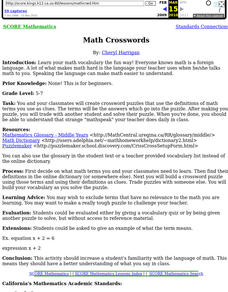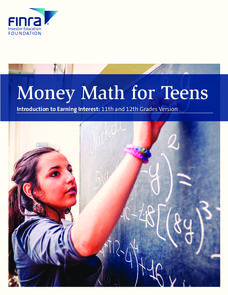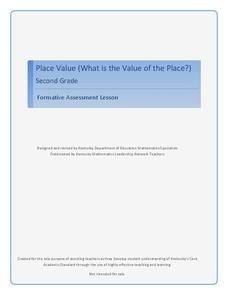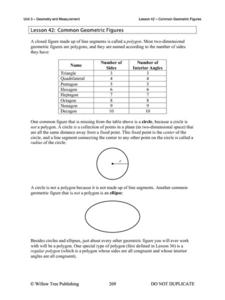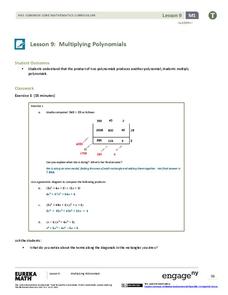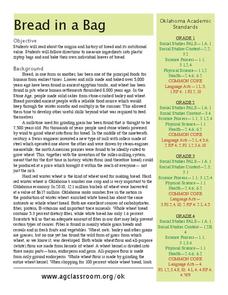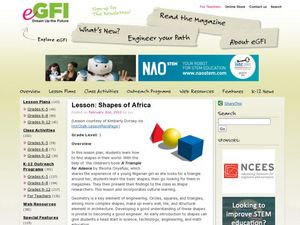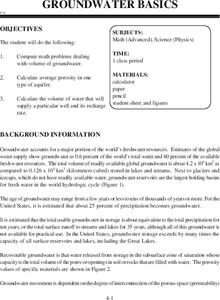Curated OER
Math Crosswords
Students create crossword puzzles that use the definitions of math terms as clues. The terms be the answers which go into the puzzle. After making their puzzle, students trade with another student and solve their puzzle.
Curated OER
Geo Jammin' - Day 1, Lesson 3: Math Moments on My Mind
Second graders write a Math Moments journal.
PBS
Surface Area and Volume
You and your class will like this lesson on using visual models to relate the volume and surface area of solid shapes. Learners construct three-dimensional forms using nets. They calculate the surface area and volume for each and then...
Teach Engineering
Levers that Lift
Introduce your class to to the remaining three simple machines-- the lever, pulley, and the wheel-and-axle with a plan that includes the three different types of levers in the discussion of levers. The lesson continues with the...
Curated OER
Kennedy Lesson Plan: Best Buddies
Students discuss disabilities. In this "Best Buddies" lesson, students take a look at programs that help people with disabilities and discover what role those people play in those programs. They work in pairs to explore the "Best...
SaveandInvest.org
Introduction to Earning Interest: Grades 11-12
Does your bank pay you for allowing them to hold your money? Class members investigate three different ways money can make more money. Topics include certificates of deposit, statement savings accounts, and money market accounts....
Curated OER
Skate Party
Learners use the Frayer model during problem solving. In this problem solving lesson, they examine multiple methods of data collection to solve real world problems. Resources are provided.
Hawaiʻi State Department of Education
Symmetrical Objects
In order to better understand how to locate a plane of symmetry in 3-dimensional objects, learners create a dance. The class reviews dance and math symmetry, then they practice making symmetrical shapes and movements with a partner....
Curated OER
Number Operations
Inject fun into your math review! Pupils review basic math operations with decimals as well as addition and subtraction with simple fractions. In this number operations instructional activity, students work in groups to create a game for...
Curated OER
Volcanoes: Kindergarten Lesson Plans and Activities
In the pre-lab, kindergarteners mimic the movements of the eruption of a volcano and discover various volcanoes around the United States. Then, pupils sort different types of volcanic rocks in the lab before learning how volcanoes grow...
EngageNY
Slicing a Rectangular Prism with a Plane
What do you get when you slice a prism? Pupils discover that the answer depends on how the prism is sliced. The second half of the 29-part module focuses on three-dimensional objects. Learners use their two-dimensional vocabulary and...
Curated OER
Place Value - What Is the Value of the Place?
Second graders build number sense in an activity that requires the matching of base 10 representations to numbers. It is the teachers responsibility to gauge student understanding and involvement while class members work in groups.
Curated OER
Cutting Corners - Parts 1 and 2
Students use optimization concepts to design their own container. In this optimization lesson plan, students understand how the optimization concept is critical in calculus and why products are packaged the way they are.
Curated OER
Does Your Field Measure Up
Young scholars measure angles using a plane table kit. In this geometry lesson, students use trigonometric identities to find the values of the length of a football field.
Willow Tree
Common Geometric Figures
Geometry could be called the study of figures. An overview of the figures found in a typical geometry course contains a study of different triangles, quadrilaterals, and regular polygons.
Willow Tree
Multiplying Polynomials
Make two parts into a whole. Scholars learn to multiply polynomials to create a simplified polynomial expression. Polynomials include monomial, binomials, and trinomials.
Curated OER
Hazards: Kindergarten Lesson Plans and Activities
The last unit in the series allows kindergarteners to see the dangers and hazards associated with each of the natural disasters learned so far in the series—earthquakes and volcanoes. They listen to sounds associated with the...
LABScI
Circulation and Respiration: Vital Signs
What do your vital signs tell your doctor? An engaging hands-on lesson has your learners monitor their own lung capacity, blood pressure, and heart rate. They then connect the vital measures to the workings of the circulatory and...
Curated OER
Bread in a Bag
Could the history of bread really be interesting? Yes, it could! An informational text gives scholars wheat production background from 8,000 years ago, discussing different types of bread and the current industry in Oklahoma. Learners...
Curated OER
Multiple Representations
Every topic or subject has its own special jargon. Learners work on their math vocabulary as it relates to basic algebra terms. They define and identify function, functional notation, ordered pairs, rate of change, slope,...
Curated OER
Shapes of Africa
First graders learn the names of geometric shapes and about African cultures. In this geometry and culture lesson, 1st graders describe real world objects and learn to name them with geometric terms such as square, circle, and triangle....
Curated OER
Investigation - What Does 1,000 Look Like?
Second graders determine what 1,000 items look like. In this math investigation instructional activity, 2nd graders collect 1,000 items and determine the best way to count them by tens and hundreds. They can use stickers on notecards to...
EngageNY
Markup and Markdown Problems
There is a 100 percent chance this resource will help pupils connect percents to financial literacy. Young mathematicians use their knowledge of percents to find markups and markdowns in financial situations in the seventh segment in a...
Curated OER
Groundwater Basics
Groundwater is an essential natural resource, not to mention a fascinating topic to study. Here is a series of twelve amazing lessons on the water source and how we use it in our daily lives. Concepts require higher math and physics...
